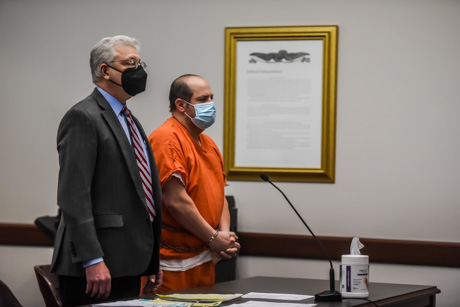
If Michael Tomaszewski were to receive the maximum sentence in prison under the law for his crimes, the court would have no leverage to ensure he paid back his victims the more than $500,000 he stole from them, County Court Judge Charles Zambito told a courtroom full of people defrauded by the disgraced funeral director this morning.
To help make sure Tomaszewski is motivated to make restitution, Zambito sent him to prison for a bit less than the maximum term.
Instead of 2 1/2 to seven years in prison, Zambito ordered Tomaszewski to serve from two to six years on the most serious charge he admitted -- grand larceny in the third degree.
On his scheme to defraud and his offering a false instrument for filing, the sentence was 1/3 to four years each, and on the misdemeanor improper burial charge, 364 days.
All sentences are to run concurrently.
"What I can’t break away from is that for 12 years, you went to work every day knowing that the day before you had broken the law and you were going to break the law again," Zambito said. "This isn’t something that you forget about. This is something you don’t know about. You knew what you were supposed to do with that money. You just chose not to do it. Why? Because it was beneficial for you and you figured you would never get caught. That says more to me about your character than any good works you have ever done. I just can’t get around it."
Zambito said the best interest of the community is that Tomaszewski's victims have some assurance that restitution is possible. With a maximum sentence, once Tomaszewski's time was served, he couldn't be hauled back into court if he stopped paying restitution. Today's sentence will ensure that if he slips on his obligation, he can serve as much as 15 years total on the conviction.
Public Defender Jerry Ader argued for a community-based sentence (probation, with no prison time) to best ensure Tomaszewski made restitution to his victims.
During his statement to Zambito, he reminded the judge he had the latitude to use Genesee Justice as it was originally intended, to bring restorative justice to victims and offenders.
Used in that way, Tomaszewski would be required to meet individually with each of his victims so he would have to face the totality of his crimes, to feel the shame, to explain himself.
"It's innovative," Ader said. "It's not used. But it's what people want. People are longing to be heard. They want my client to feel shame, more than he's shamed already."
Interim District Attorney Kevin Finnell said he wanted to see Tomaszewski go to prison for the maximum time the law would allow, characterizing Tomaszewski's actions calculating and a crime against the whole community.
"People trusted him," Finnel said. "(His involvement in the community) was simply a way of gaining trust, to be the good guy, to make friends, 'then you will come and give your money and I will take it.' Mr. Tomaszewski took their money and then broke their trust.
"What Mr. Tomaszewski did was so egregious, so calculating, so wrong. I would submit that the court has no alternative but to sentence him to the maximum allowed and that's a 2 1/3 to a seven-year term."
Ader pushed back at what he characterized as Finnell's attempt to paint his client as some sort of evil mastermind who fooled everybody in the community just to enrich himself.
He said there is no evidence Tomaszewski has a gambling problem or a drug use problem. He said his client used the funds he failed to keep in trust to help grow his business; that he invested it in new buildings and new business ventures.
"It all went back into his business," Ader said. "It was wrong and he know it was wrong and he couldn’t stop because the business was helping people and he wanted to help people.
"My client isn't some sort of Bernie Madoff character who is stealing money in this Ponzi and living lavishly. That is somebody who should be punished for the rest of his life. This is somebody who mismanaged. And if you want to call that poor business, poor judgment, those are choices he made. Bad choices. Criminal choices. But they were choices. Yes, his intent, obviously, was to put that money back into the business but he still provided services."
Zambito didn't buy it.
"I don’t believe you are somehow sacrificing your own life, depriving yourself or your family," Zambito said. "You had what appeared to be a very successful business. You say in your pre-sentence investigation that you invested in the business. 'I needed the money for the sprinkler system. I needed the money to start the Dibble Center. Don’t you think there are other business people out there who need the money to improve their businesses, who want to do the best they can to start new ventures? They borrow the money if they don’t have it. They go to banks."
The defense delivered to the court more than 50 letters from members of the community, including letters from people who were clients of the funeral home, attesting to Tomaszewski's good character, saying he was a good guy who just made a mistake and mismanaged his business. They pointed to his involvement with the Lions Club, to his charitable work, to his support of community organizations.
Zambito said he also had a binder containing information on 91 victims of Tomaszewski's fraud, documenting more than 12 years of criminal activity that cost members of the community more than $500,000. Yes, some of those victims do only want restitution, Zambito said, but many others want justice, they want Tomaszewski to go to prison.
"They believe that the scope and breadth of your crimes outweigh the positive things that can be said about you," Zambito said. "I get that you did good things but you did it with other peoples' money."
After adjusting for the $32,000 Tomaszewski was going to pay today and five percent interest on the original amount of restitution required, Tomaszewski owes his victims $569,434.92.
Zambito ordered Tomaszewski to pay $2,000 a month upon his release from prison, which Zambito said he felt Tomaszewski would have no trouble making full restitution within 10 years of his release because he's shown he has the ability to earn money, particularly in the restaurant business.
Currently, Tomaszewski's former funeral home building is listed for sale for $1 million and another building he owns on West Main Street is listed for $165,000. He also has a pending bankruptcy with $3,242,390 in liabilities. The money owed to victims who filed claims in the federal court cannot be discharged through the bankruptcy proceeding.
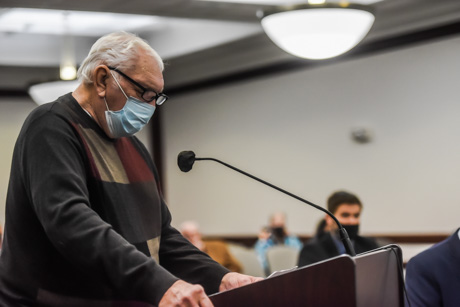
Al Kurek, one of Tomaszewski's victims, made a statement to the court during today's hearing. He called Tomaszewski one of the community's "golden boys" who had a successful business and won people's trust but squandered his accomplishment.
"There was only one problem," Kurek said. "All the time he was offering comfort and condolences, he was practicing deceit. He sat across from clients over the years, stared them in the eye, shook their hands providing them with assurance and comfort while all the time knowing that their monies were going directly into his pocket.
"What he actually gave clients was mental anguish and suffering as well as lies, pain, grief, and heartache. The Batavia community had its soul scorched when all of Michael's criminal and unethical activities were revealed."
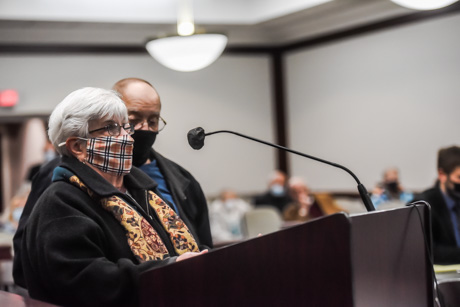
Joan Mariucci said Tomaszewski stole her trust.
"There are two Rs," she said. "There’s rich and there’s retired. We’re retired. We’re not the rich. We don’t have that kind of money just laying around to give to someone else."
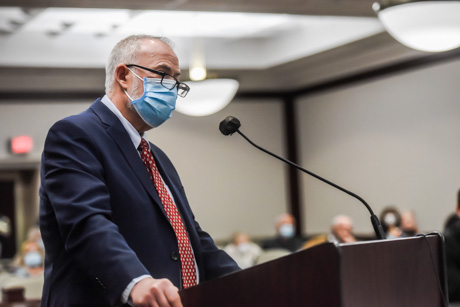
Interim District Attorney Kevin Finnell.
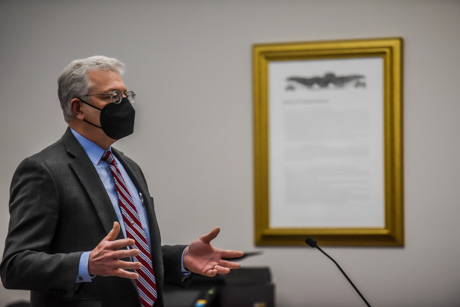
Public Defender Jerry Ader.
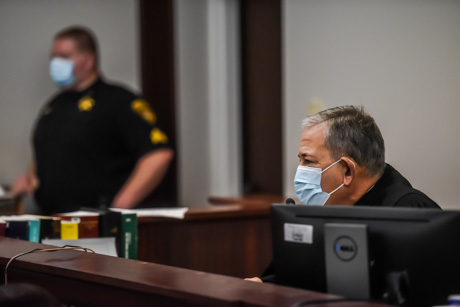
Judge Charles Zambito.
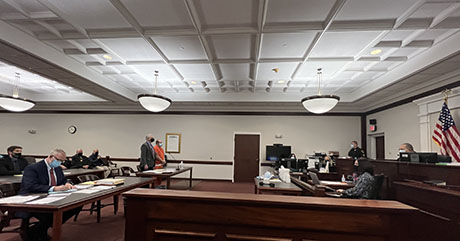

A new episode on the TV
A new episode on the TV series: "American Greed."
This guy should be put in
This guy should be put in prison for a lot longer than this and should have to make full restitution to these people. He will never be able to repay the people for the grief, pain, suffering, and despair. He took advantage of these people; it did not matter who it was or who passed away, children, military people, elderly people, etc. He should have been given max on all charges; he should have been made make full restitution and pay for all expenses of all the deceased to receive proper burials. This is more than just an injustice. I hope when he and his family pass away, no one treats them as badly as he treated the people in their time of need.